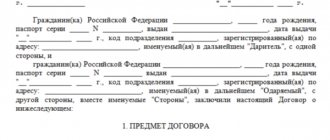Despite the fact that privatization has existed for more than twenty years, today the state housing stock has not yet been completely transferred to private ownership and citizens still have this opportunity. Since non-privatized housing cannot be inherited by law, many people wonder who gets municipal housing after the tenant dies and whether it is somehow possible to leave the apartment to his relatives.
In practice, the tenant of municipal housing, when signing an agreement, receives a number of powers that allow him to fully use the living space provided to him, namely:
- Register your close relatives and, in some cases, other persons in this apartment, in accordance with the Housing Code of the Russian Federation;
- Sublease housing;
- Exchange an apartment for similar housing at a different address;
- Pay less for all utilities, with the exception of contributions for major repairs.
Of course, the tenant must either coordinate all actions with the municipality that provided the apartment, or notify this body of his decision.
What to refer to in the contract
Close relatives of the employer who live with him are initially included in the social tenancy agreement, according to which they receive the same right to use it and participate in privatization if it is carried out. In other words, citizens registered on a permanent basis and included in the contract have the same rights as the employer himself.
Dear readers!
Our articles talk about typical ways to resolve legal issues, but each case is unique. If you want to find out how to solve your specific problem, please contact the online consultant form on the right →
It's fast and free!
Or call us by phone (24/7):
If you want to find out how to solve your particular problem, call us by phone. It's fast and free!
+7 Moscow,
Moscow region
+7 Saint Petersburg,
Leningrad region
+7 Regions
(the call is free for all regions of Russia)
Categories of close relatives of the employer:
- Spouse;
- Biological and adopted children;
- Parents and adoptive parents;
- Other dependent relatives.
If initially the tenant did not have a family living with him in the municipal apartment, or lived there only with his parents and neighbors, then in the future, in order to register a new tenant, it will be necessary to obtain the consent of all registered persons for this procedure. The only exceptions are minor children, who are registered regardless of the opinions of other residents and the number of square meters of living space.
In addition to the consent of all residents to register an adult, you will need to obtain permission from the landlord, that is, the municipal authority. Without all the necessary documents, the migration service will simply refuse registration on completely legal grounds.
Is it necessary to enter into an inheritance if the apartment is privatized?
The privatized living space, like the rest of the property of the deceased, constitutes the estate, and if the successors wish, it can be registered as their property only after completing the established algorithm of actions.
Ignoring it will entail deprivation of the right to inherit and the transfer of the apartment to the heirs of the next order, or to the state.
There is no need to separately inherit an apartment only if it was privatized to the heir, that is, legally it was his property. However, the owners of a share of living space, in order to add to it the share of the deceased co-owner, also need to take steps to accept the inheritance.
Transfer of property
Living and using an apartment obtained as a result of concluding a social tenancy agreement imposes very strong restrictions on the rights to dispose of this real estate.
That is, in fact, the tenant is not its full owner and does not have any title documents other than those that give him the opportunity to live in this residential area. Tenants do not have the right to sell, donate or bequeath municipal housing even to their closest relatives, since this property is owned by the state and not their personal property.
After the death of the tenant, a municipal apartment does not lose its legal status and continues to belong to the state or municipal body. Referring to Article 82 of the Housing Code of the Russian Federation, each member of the family of a deceased tenant, being an adult and fully capable, has the right to request the renewal of a social tenancy agreement in his own name on exactly the same conditions.
If no family member lived with the tenant in a municipal apartment or was registered there, the municipality has the right to give this housing to any other person by concluding a social tenancy agreement with that person.
How is real estate divided?
If several successors claim the inheritance, then the inheritance mass is divided between them in a certain proportion. For example, if an apartment was privatized for two owners (for example, a spouse and a child), then they are the owners of equal shares; if one person dies, then 1/3 remains the property of the living spouse, 1/3 belongs to their child, and 1/3 of the deceased divided among successors.
If the couple had no more children and there are no other first-line heirs, then a third of the apartment will be divided equally between the spouse and the child.
If the spouse who privatized the apartment individually died, then the apartment in full will be divided between the heirs, then each person (both the spouse and the child) will receive 1/2 of the apartment.
Agreement with the municipality
Government regulations of the Russian Federation approve a unified form of social tenancy agreement. This document contains information about the characteristics of the apartment provided, information about the citizens living in it, as well as the rights and obligations of both parties. If over time and due to changing circumstances it becomes necessary to make any changes to the contract, then this can be done in accordance with the requirements of the Housing Code of the Russian Federation, namely:
- Tenants of municipal housing living in it on the basis of separate contracts are given the opportunity to formalize them with a common document. So, if the citizens living in the apartment are not relatives and live in the same room under the conditions of a communal apartment, then when a marriage is concluded between such residents, it is possible to issue one document for two;
- After the death of the employer, each of the relatives registered with him can re-register his social tenancy agreement.
However, it is worth considering the conditions under which the contract can be terminated:
- Mutual consent of the parties;
- Confirmation of facts of gross violation of the terms of the agreement by the employer;
- Use of the apartment for other purposes;
- Impossibility of living in the premises due to its reconstruction, decision to demolish the building or transfer of a plot of land for state needs.
If the contract was terminated through no fault of the tenant, the municipality is obliged to provide this citizen with other housing.
Powers and obligations of a tenant under a social tenancy agreement
The tenant of municipal housing has a wide range of rights in relation to this real estate:
- grant the right to other people to live in an apartment free of charge or for a fee (unless this is prohibited by the norms of the current housing legislation);
- exchange residential premises for similar real estate from a fund owned by the municipality (according to the provisions of Article 72 of the Housing Code);
- use the capital repair service provided free of charge;
- use various services provided for money by public utilities.
The responsibilities of a municipal housing tenant are as follows:
- Use the apartment strictly for its intended purpose (for the residence of the tenant and his family members).
- Carry out routine repairs and constantly monitor the proper operation of communications in the residential premises.
- Pay for services under the rental agreement, as well as utility bills, on time.
Re-registration procedure
The re-registration of a social tenancy agreement after the death of the tenant of the apartment takes place directly in the municipal local government authorities, which are authorized to deal with housing issues in a given locality. In some cases, it is possible to renew the contract through the Multifunctional Center if this institution provides similar services in a given locality.
Before contacting one of the institutions listed above, a citizen who lived in a municipal apartment with a now deceased tenant must:
- Agree with other residents that the contract will be reissued in his name;
- Discharge a deceased tenant from the apartment by contacting the migration service at the location of the residence and providing a death certificate;
- Prepare the required papers for renewal of the contract.
After the preparatory stage has been completed, a new agreement is concluded. A copy of it should be provided to the management organization so that appropriate changes can be made to the personal account for payment of utility services.
In the event that residents are unable to independently come to a decision about to whom the contract will be renewed, the issue must be resolved in court.
How to inherit by law?
In the absence of a will, inheritance of privatized housing occurs in order of priority in accordance with the norms of the Civil Code of the Russian Federation.
Required documents
To apply for acceptance of inheritance, the following documents must be submitted::
- death certificate of the owner;
- documents confirming family ties with the deceased;
- extract from the place of residence of the deceased;
- applicant's passport;
- privatization agreement;
- extract from the Unified State Register of Real Estate;
- check for payment of state duty.
Deadlines
According to Art. 1154 of the Civil Code of the Russian Federation, regardless of how the apartment is inherited, the period for accepting the inheritance is six months from the date of opening of the inheritance. The date of opening of the inheritance is considered to be the day of death of the testator.
State duty
Regardless of how the apartment is inherited, close relatives must pay a state fee in the amount of 0.3% of the cost of the privatized housing , but not more than 100 thousand rubles, to obtain a certificate of inheritance.
If the heirs are not close relatives of the testator, then the state duty will be 0.6% of the cost of the apartment, but not more than 1 million rubles. (clause 22 of article 333.24 of the Tax Code of the Russian Federation).
What documents will be required?
In order to re-register a social tenancy agreement for a new tenant after the death of the previous tenant, you must submit a corresponding application to the municipal authority. It contains all information about registered residents and the grounds for re-registration of the agreement.
When re-registration, the personal presence of each tenant at the municipal authority is required. If one of them cannot be present for good reasons, he needs to write and have his consent to draw up a new agreement in the name of a certain person at a notary’s office, and then transfer the agreement to the other participants.
In addition to the application, you will also need:
- Personal passport of each participant registered in the apartment;
- Certificate certifying the death of the employer;
- Previous social tenancy agreement;
- An extract from the personal account confirming the absence of debt for utility services;
- A certificate from the house register, which indicates all citizens registered in the premises.
After the contract is reissued, each registered person will receive the right to participate in general privatization or privatize their own part of the housing.
If grandchildren are registered
In some cases, it is impossible to automatically renew a social tenancy agreement. The most common example of this case is a situation in which the tenant of the living space is a grandmother living with her grandson registered there. It would seem that the situation does not predispose to the emergence of any difficulties, but it becomes more complicated if the grandson is not registered in the apartment as a family member. That is, it was not included in the social tenancy agreement initially, but was registered later, on the initiative of the grandmother.
Of course, each of the tenants, referring to the Housing Code of the Russian Federation, has the right to register additional tenants in the rented apartment, especially if they live there independently and the square meters allow it. Thus, registration gives the grandson the right to live in an apartment with the status of an outsider who cannot claim this housing.
You can solve the problem by submitting an application to the housing department of the municipal authority. The application must reflect the request for renewal of the contract and the grounds for such a procedure. The most likely response from the municipality will be a written refusal. This refusal is an official document. You must save it by making a copy for yourself. Afterwards, documents are prepared certifying the relationship of the person who wants to re-register the contract in his name with the tenant of the apartment. After this, a statement of claim is submitted to the court, to which the collected documents are attached. Further, the contract is renewed on the basis of a court decision.
How to register a non-privatized apartment after death
A special procedure has been established for the succession of rights to a municipal apartment.
The main feature is that there is no actual inheritance, but a re-registration of the employment agreement to another person.
Inheritance of a given premises
A municipal apartment, by definition, belongs to the authorities of the relevant municipality and is considered the property of the state. So the successors of the deceased person will not be able to inherit. According to civil law, you can only leave your own property as an inheritance.
In succession to a municipal apartment, the social tenancy agreement is being reissued. As a rule, everyone who is registered in such housing has the right to live in it and use the premises on an equal basis. However, among them one is elected who will be responsible for the legal operation of the apartment.
This person is responsible for the safety of housing, for compliance with living standards in apartment buildings, etc. After the death of such a person, another is simply chosen to perform the functions of a responsible tenant.
To be a full owner of an apartment, it is necessary to carry out privatization. Everyone who is registered in the corresponding apartment and has the right to use it has the right to privatization. With privatization, they all become owners.
However, residents who have reached the age of 18 at the time of privatization may refuse to participate in privatization in favor of another resident or simply refuse.
Minor citizens do not have this right, so they become the owners of this apartment without fail.
Minors cannot independently register their rights to housing with the authorized body. So they are given a deferment until they turn 18.
How to re-register?
The administration of the relevant district is authorized to dispose of municipal housing. Therefore, the application must go there. You can also carry out the entire procedure through the MFC.
But before that, some mandatory steps must be taken. So, the first step is to check the status of the apartment. It must be eligible for privatization.
According to Art. 4 of Law No. 1541-1, the following categories of housing are not subject to privatization:
- with an officially established emergency condition;
- which is special-purpose housing (in military camps, closed facilities);
- service living quarters;
- located within zones with special environmental conditions.
If the housing does not have one of the above statuses, you can begin collecting documents. The exact list of required documents must be clarified with the administration or the MFC.
After submitting the documents and application, you must wait for the response from the authorized body. The response is issued within a month and if the administration approves the privatization, then the parties involved are invited to conclude an agreement.
After concluding such an agreement, it is necessary to register ownership in Rosreestr during a personal visit or on the website.
Only after this will the residents of the apartment have the right to dispose of it. If one of the owners dies, then inheritance is carried out in accordance with the general procedure. However, the owners can leave the apartment or a share in it to any person, even those who are not relatives or residents of the apartment.
List of documents
You can find out exactly what documents will be needed for privatization only at the administration or the MFC. However, the following documents must be submitted without fail.
Identification documents of residents participating in privatization:
- passports of all persons who are already 14 years old;
- birth certificates of persons under 14 years of age.
It is worth noting that privatization is the prerogative exclusively of citizens of the Russian Federation. Foreign citizens and stateless persons cannot obtain ownership of an apartment from the state.
You will also need documentation for the apartment, which includes:
- documents from the BTI and cadastre;
- an extract from the passport office indicating the circle of persons who are registered in the apartment;
- rental agreement for a municipal apartment;
- a certificate from a housing organization confirming the absence of utility debts.
In addition, depending on the situation, the following documents may be required:
- notarized power of attorney – if privatization is carried out with the participation of a representative;
- permission from the guardianship authority - when one of the persons participating in privatization is a minor and does not have legal representatives.
In exceptional cases, when the privatizing parties are not relatives, the administration requires an agreement on the shares in which the apartments will be privatized.
What is the statute of limitations for entering into inheritance?
Can a common-law wife claim an inheritance? Read here.
How to register an inheritance for an apartment, read the link:
Such an agreement is drawn up by the residents themselves in simple written form.
When supporting parents
The situation described above, alas, is not the most difficult. It will be more difficult:
- An individual who is dependent on and cares for an elderly tenant of a municipal apartment;
- Children of the tenant who are dependent on him, but are not registered in the living space;
- The employer opposes the registration of children of a registered person who is dependent on them;
- If the employer is registered in a psychiatric clinic.
The most common option is when the tenant’s son is interested in living space after his death, since he does not have personal housing and lives in a dormitory. Under these circumstances, after the death of the tenant, the rights to his living space for the children will not be retained. The general rules of inheritance do not apply here, since the real estate is owned by the state. Such a difficult issue can be resolved by declaring the parent incompetent according to the conclusion of a medical institution, and by formalizing official guardianship over him. This is the only way to inherit municipal housing after the death of the parent who is the tenant of the property.










